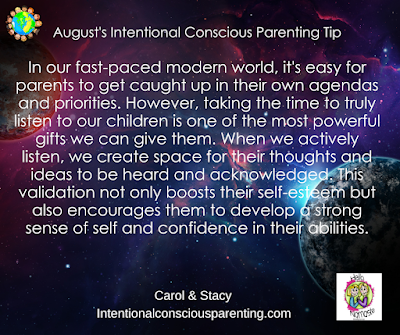As parents, we often find ourselves in the role of guiding and teaching our children, but it's essential to remember that their ideas and who they are as individuals matter. Every child is unique, with their own thoughts, feelings, and perspectives on the world. It's our responsibility to create a safe and nurturing environment where they can express themselves, be heard, and have their ideas validated.
Together, let's explore the importance of listening to children and how it can positively impact their development and overall well-being.
The Power of Listening
In our fast-paced modern world, it's easy for parents to get caught up in their own agendas and priorities. However, taking the time to truly listen to our children is one of the most powerful gifts we can give them. When we actively listen, we create space for their thoughts and ideas to be heard and acknowledged. This validation not only boosts their self-esteem but also encourages them to develop a strong sense of self and confidence in their abilities.
When we listen attentively, we also gain valuable insights into our children's inner world. We discover their passions, fears, dreams, and concerns. This knowledge allows us to better understand their needs and tailor our parenting approach accordingly. By engaging in meaningful conversations and asking open-ended questions, we encourage them to think critically, express themselves articulately, and develop essential communication skills that will benefit them throughout their lives.
Moreover, listening to our children fosters a deep sense of trust and connection. When they feel heard and understood, they are more likely to come to us with their problems, seek guidance, and share their experiences openly. This open line of communication strengthens our bond with them and enhances our ability to support and guide them effectively.
Validating Children's Ideas
Validating our children's ideas means acknowledging and respecting their thoughts and opinions, regardless of whether we agree with them or not. It's important to remember that children have unique perspectives shaped by their limited life experiences. Their ideas may seem unconventional or even illogical to us as adults, but dismissing or invalidating them can have detrimental effects on their self-esteem and confidence.
When we validate our children's ideas, we show them that their thoughts matter and that they are capable of independent thinking. This validation nurtures their creativity, encourages them to explore new ideas, and helps them develop problem-solving skills. By fostering an environment where their ideas are valued, we empower them to think outside the box and approach challenges with confidence and resilience.
Validating a child's ideas teaches them the importance of respecting others' opinions. When they experience firsthand how their ideas are respected and valued, they are more likely to extend the same courtesy to their peers and cultivate a culture of empathy and understanding. This skill is crucial for building positive relationships and navigating the complexities of the social world.
Practical Tips for Implementing Conscious Parenting Practices That Prioritize Listening & Validation.
Implementing conscious parenting practices that prioritize listening and validating our children's ideas may require some intentional effort. Here are a few practical tips to help you create an environment that fosters open communication and supports your child's individuality:
1. Create dedicated quality time: Set aside dedicated one-on-one time with each child to engage in meaningful conversations. This uninterrupted time allows for deep connection and encourages open sharing.
2. Practice active listening: Give your child your full attention when they are speaking, maintain eye contact, and respond with empathy and understanding. Avoid interrupting or dismissing their ideas.
3. Encourage self-expression: Provide opportunities for your child to express themselves creatively, whether through art, writing, or other forms of self-expression. Celebrate their unique ideas and creations.
4. Foster a safe and non-judgmental environment: Create an atmosphere where your child feels safe to share their thoughts and ideas without fear of criticism or judgment. Encourage open dialogue and respect their perspective.
5. Be curious and ask open-ended questions: Show genuine interest in your child's ideas by asking open-ended questions that invite them to share more. This demonstrates that you value their thoughts and encourages deeper conversations.
Listening to our children and validating their ideas is a fundamental aspect of conscious parenting. By creating an environment where they feel heard and respected, we empower them to develop their sense of self, build strong communication skills, and cultivate empathy for others. As parents, it's our responsibility to prioritize our children's individuality and nurture their unique perspectives, ultimately laying the foundation for their future success and happiness.
Thank you for joining us and supporting the inner light of the children,
Carol and Stacy
Learn more about us and the resources we've put together to help you along your conscious parenting/living path.


No comments:
Post a Comment